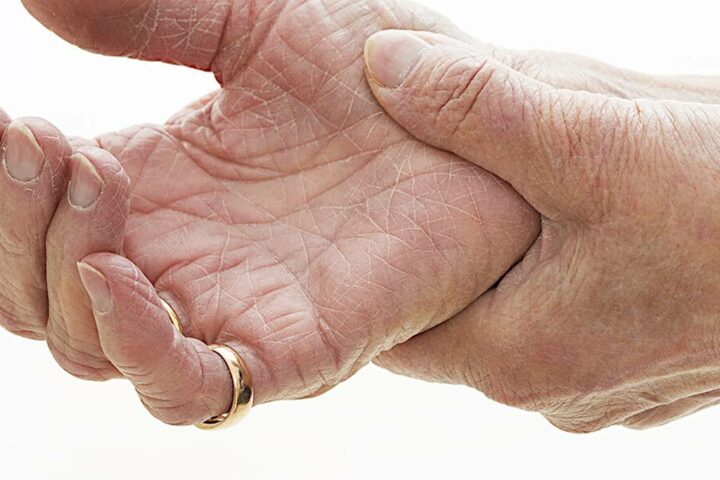Arthritis is an inflammatory condition that involves the joints, or the structures that connect the bones.
It is characterised by swelling, tumefaction, redness, stiffness and pain, as well as by a temperature increase in the affected area. Deformation of the joints can also occur in the most severe cases.
It is essential to distinguish arthritis from arthrosis, since there is often confusion between the two pathologies.
In fact, despite having some traits in common, arthrosis is not an inflammatory disease but a chronic degenerative form.
Types of arthritis
There are various forms of arthritis, which have different causes and characteristics.
Rheumatoid arthritis
Rheumatoid arthritis is the most common form. It is an autoimmune disease that appears as a result of malfunctioning of the immune system, and causes chronic inflammation of the joints.
In addition to the generic symptoms of arthritis, the symptoms of rheumatoid arthritis include:
- Tiredness
- Fever
- Losing weight
- Pain
- Loss of functionality of the joints
- Muscular hypotrophy
Involvement of the wrist and hands is frequent. A little more rarely, it also affects the neck, shoulders, elbows, hips, knees, ankles and feet.
Furthermore, there are several mild symptoms that can appear fairly early, such as swelling and redness of the joints and difficulties in moving as soon as you wake up.
It is very difficult to diagnose rheumatoid arthritis. This is because the first symptoms develop slowly and gradually, and there is no specific test for this disease.
As a rule, the doctor takes a medical history, and asks the patient for a description of the symptoms and reconstructs the patient’s clinical history and that of his/her relatives.
Next, the doctor examines the patient’s health and in particular their reflexes, muscle strength and skin.
In some cases it can be useful to perform an x-ray, but there are also laboratory tests that can confirm a doctor’s diagnosis. These include the Rheuma Test and the Anti-CCP Test.
For treating rheumatoid arthritis it is very important to start therapy when the disease is still in its infancy. This allows the pain to be reduced and the deformation processes that wear out the joints to be stopped or slowed down. In this way the subject can continue to work without impediments.
You can be affected by rheumatoid arthritis at any age, even in childhood, with the infantile form of the disease. There is also a form of juvenile rheumatoid arthritis that falls into the category of juvenile idiopathic arthritis (AIG). Its causes, however, have not yet been identified.
Treatment for rheumatoid arthritis involves taking:
- Analgesic drugs, to reduce pain
- Corticosteroid drugs or non-steroidal anti-inflammatory drugs (NSAIDs), to reduce inflammation
The treatment of rheumatoid arthritis also takes the lifestyle and diet into account.
It is important to find a balance between rest and exercise, as well as a eating the correct amount of calories, protein and calcium.
There are also cures and natural remedies that somehow relieve joint pain, such as mud baths and devil’s claw. The latter can be used in the form of an ointment or gel, or taken orally in the form of dry extract or a mother tincture.
Unfortunately, however, these remedies cannot be used to counteract the causes of the disease.
Psoriatic arthritis
There is another form of arthritis, which in 1 case out of 4 is very similar to the rheumatoid variety. It is psoriatic arthritis, one of the most complex forms of this pathology, characterized by chronic articular inflammation.
It can affect any joint and it also manifests with circumscribed pain, swelling and joint stiffness.
The causes are still unknown, but some studies suggest that there is a genetic predisposition to contracting the disease. The joints and other tissues would then be attacked by the immune system of the predisposed subjects.
An early diagnosis of the disease is essential to identify therapies that help prevent the worsening of symptoms.
As in the case of rheumatoid arthritis, drug therapy involves taking non-steroidal anti-inflammatory drugs (NSAIDs) for a limited period.
Physicians also recommend that you perform physical activity and contact a physiotherapist to keep your joints active and functional.
Other natural treatments for psoriatic arthritis include the application of aloe vera gel and the use of turmeric.
Furthermore, it is important to follow a diet consisting of foods that do not make you fat and that do not increase inflammation. Red meat, preserved foods and gluten-containing foods and animal proteins are therefore not recommended.
Other forms of arthritis
Among the less common forms of arthritis, reactive arthritis, also known as spondyloarthritis, should be mentioned. It is an infectious and autoimmune disease that, in addition to the joints, can also affect the eyes and the urethra. In these last two cases it also takes the name of Reiter’s syndrome. It is mainly treated with palliative drugs.
Another form of arthritis is septic, characterized by a bacterial infection that affects the joint. Normally this disease is treated with antibiotic drugs.
Gouty arthritis, on the other hand, is a dysfunction of the metabolism followed by the deposit of uric acid crystals in the joints. This leads to sudden manifestations of pain (especially at night), inflammation in the tissues of the joints and signs of swelling.
The symptoms of arthritis can initially affect the hands, fingers and wrists. The most important are pain, swelling, stiffness and deformation.
These symptoms manifest themselves symmetrically. This means that if the symptoms tend to manifest on the right hand, then they will also manifest on the left.
But the hands are not the only area affected by this disease. Among the other areas often affected by arthritis there are also the shoulder, the elbow and the knee, always in a symmetrical manner.
When the disease indiscriminately affects various organs we can speak of undifferentiated arthritis.
Diagnosis
As already seen, arthritis is a disease that gradually manifests itself. Symptoms are often difficult to recognize when it is still in its infancy.
However, if you notice a swelling in your joints that persists for more than 6 weeks, you should contact your doctor.
Distinguishing the various forms of arthritis can prove to be complicated. This is why it is important to evaluate the symptoms and exclude some types, as well as the presence of other diseases.
To do this there is no single exam. The doctor can in fact choose different approaches for the diagnosis process.
Once the medical history has been performed, the most common tests are those of blood and urine. Another analysis to be performed is that of the synovial fluid present in the joints.
For diagnosis it may also be necessary to rely on radiographs, computed tomography and magnetic resonance imaging.
In addition, it may be useful to perform an ultrasound or, in some cases, a small arthroscopic procedure.
Causes
The causes of arthritis can be of traumatic, metabolic, infectious, autoimmune and idiopathic origin.
In the most common case, that is rheumatoid arthritis, the disease depends on a malfunction of the immune system.
We still do not know for sure why the immune system attacks its tissues, but genetic and environmental factors are among the risk factors.
Other possible risk factors are related to age, gender, the use of contraceptives, smoking and other hormonal and food factors. For example, women are exposed to risk more than men.
Even with regard to psoriatic arthritis, some studies state that there seems to be a genetic predisposition to contracting the disease.
In the case of reactive, infectious and autoimmune arthritis, the bacterial pathogens involved are microorganisms. Among these we can list chlamydia, salmonella, shigella, yersinia and campylobacter.
Another form of arthritis, septic, is due to infection in the joint.
Gouty arthritis, on the other hand, is caused by the deposit of uric acid crystals in the joints.
Symptoms
The most common arthritis symptoms are:
- Pain
- Swelling
- Warmth
- Facial flushing
- Joint stiffness
- Loss of function of the joints
These usually develop gradually over a period of a few weeks. In some cases, however, it cannot be excluded that the disease worsens faster than expected.
In the case of septic arthritis, other symptoms are fever and chills. In gouty arthritis, on the other hand, tumefactions are also noted, referred to as “tophi”.
As for rheumatoid arthritis, being a systemic disease this can affect various organs and systems. The consequences are serious and worsen the clinical picture of the patient.
Other possible symptoms are:
- Feeling tired
- Losing weight
- Aching muscles
Physical therapy involves the execution of physiotherapy exercises for the treatment and rehabilitation of the hand, hip, knee, foot and limbs in general.
Therapies
At the moment there is no definitive cure for rheumatoid arthritis. There are, however, some therapies that reduce the pain perceived by the patient and improve his mobility.
First of all, the patient must alternate periods of rest with adequate physical activity. This is to avoid consequences, such as weight gain, which promote the development of arthritis.
Among the natural remedies can be used cold and heat therapy.
Cold therapy involves applying ice packs or sprays on the affected joint. In this way the nerves become less sensitive and pain is reduced.
The use of microwaves, steam and ultrasound, on the other hand, is useful for increasing blood flow.
Regarding drug therapy, at first it is possible to take non-steroidal anti-inflammatory drugs (NSAIDs) and corticosteroids.
In the treatment of psoriatic arthritis in milder forms, NSAIDs are often the only therapy used.
It is important, however, not to continue taking these drugs for a long time so as not to suffer their side effects.
NSAIDs can contribute to the appearance of stomach ache, hypersensitivity and ulcers. Corticosteroids, on the other hand, can lead to diabetes, hypertension, swelling of the face, thinning of the bones and other side effects.
In some special cases and exclusively for rheumatoid arthritis patients, the doctor may prescribe biological drugs.
As for the deforming arthritis in the hands, the treatment also goes through natural remedies, including:
- Castor oil, which contains an active ingredient (ricinoleic acid) with anti-inflammatory and analgesic action
- Fenugreek seeds, which have anti-inflammatory and antioxidant effects
- Turmeric, which possesses anti-inflammatory, antiseptic, antibacterial and antioxidant properties
- Epsom salts, which relax the joint relieving pain and reducing inflammation and rigidity
If you liked this article, how about sharing it on your Facebook profile? You could help those in your contacts who have a family member who suffers from arthritis!






